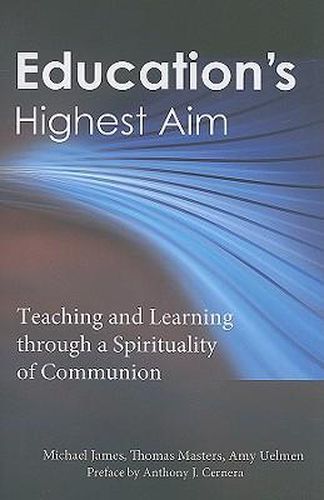Readings Newsletter
Become a Readings Member to make your shopping experience even easier.
Sign in or sign up for free!
You’re not far away from qualifying for FREE standard shipping within Australia
You’ve qualified for FREE standard shipping within Australia
The cart is loading…






Education’s Highest Aim will be valuable for anyone interested in understanding and improving education – teachers’; groups; school administrators; university courses in curriculum, instruction, or educational foundations; parents’ organizations; developers of public policy.
Here is an educational philosophy, a pedagogy and a practice grounded in the vision of unity, in a spirituality of communion. It is one that invites students, faculty, staff, administrators and families to work cooperatively for the development of the whole person. This is an educational aim of the highest order worth working together to achieve. Anthony J. Cernera, Ph.D.
President of the International Federation of Catholic Universities … At the heart of the authors’ application … is the principle that the modern tensions of educational practice, including fragmentation, isolation, and secularism, can be reimagined through a ‘spirituality of communion’ among ‘administrators, students, teachers, counselors, coaches, and maintenance staff.’ The authors contend that Lubich’s description of ‘existential identity, ’ where one ‘achieves unity with another through a process of emptying oneself to be fully present with the other, ’ can provide the harmony that is missing from a society in which individual competence is the norm.
Many of the stories and discussions could be ideal for an approach to the classroom and faculty meetings, and to learning how to walk alongside one another wherever conflict arises. In both complexity and simplicity, the book is a pleasant reminder of Jesus’s summary of the law by first loving God and then loving one another. Christian administrators, teachers, and parents will find this book of particular interest. Karen Buchanan and Ken McChesney
from their review in Journal of Education and Christian Belief; Vol. 16, no. 1 (Spring 2012)
$9.00 standard shipping within Australia
FREE standard shipping within Australia for orders over $100.00
Express & International shipping calculated at checkout
Education’s Highest Aim will be valuable for anyone interested in understanding and improving education – teachers’; groups; school administrators; university courses in curriculum, instruction, or educational foundations; parents’ organizations; developers of public policy.
Here is an educational philosophy, a pedagogy and a practice grounded in the vision of unity, in a spirituality of communion. It is one that invites students, faculty, staff, administrators and families to work cooperatively for the development of the whole person. This is an educational aim of the highest order worth working together to achieve. Anthony J. Cernera, Ph.D.
President of the International Federation of Catholic Universities … At the heart of the authors’ application … is the principle that the modern tensions of educational practice, including fragmentation, isolation, and secularism, can be reimagined through a ‘spirituality of communion’ among ‘administrators, students, teachers, counselors, coaches, and maintenance staff.’ The authors contend that Lubich’s description of ‘existential identity, ’ where one ‘achieves unity with another through a process of emptying oneself to be fully present with the other, ’ can provide the harmony that is missing from a society in which individual competence is the norm.
Many of the stories and discussions could be ideal for an approach to the classroom and faculty meetings, and to learning how to walk alongside one another wherever conflict arises. In both complexity and simplicity, the book is a pleasant reminder of Jesus’s summary of the law by first loving God and then loving one another. Christian administrators, teachers, and parents will find this book of particular interest. Karen Buchanan and Ken McChesney
from their review in Journal of Education and Christian Belief; Vol. 16, no. 1 (Spring 2012)